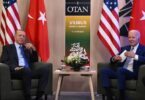Monitoring Desk
LONDON: Britain’s defenders of free speech are up in arms and prepared for a combat over plans to control on-line content material.
The Online Safety Bill coming to parliament later this year is a far-reaching effort to clamp down on dangerous and unlawful types of on-line speech, from youngster exploitation to terrorist propaganda.
However because the date attracts nearer, senior MPs from Boris Johnson’s ruling Conservative Get together are sharpening their knives to probably carve up the invoice, which additionally covers woolier authorized areas like misinformation, within the title of free speech.
Amid a wider “tradition warfare,” the hassle to form on-line harms laws is drawing in Tory heavyweights like former Brexit Secretary David Davis, who has warned the invoice may find yourself being authoritarian “accidentally,” and former Protection Secretary Liam Fox, who has warned it may have “unintended penalties.”
“The federal government could be sensible when this invoice comes ahead to present it a number of pre-legislative scrutiny, to consider all of the angles,” Fox advised POLITICO.
How the free speech brigade proceeds couldn’t solely have an effect on the invoice, but in addition weigh into worldwide talks on policing the web, that are happening amongst G7 leaders in Cornwall this summer time.
“I feel there are a complete wide selection of points related to such a invoice, which will likely be very very simple to attempt to take care of one downside, however be creating one other one,” added Fox.
When the Johnson authorities inherited plans to police Big Tech platforms from the prior administration beneath Theresa Might, opponents had hoped the brand new PM would possibly stick it within the bin.
The previous Every day Telegraph columnist courted controversy in his articles, including one likening veiled Muslim women to letterboxes, and has lengthy cultivated a political model as a freedom fighter.
However he did not. In December, his government said on-line content material and sure authorized exercise could possibly be thought of dangerous if “it provides rise to a fairly foreseeable danger of a major opposed bodily or psychological influence on people.”
Opponents noticed crimson over the definition. “The Authorities’s proposals … could be overbearing and essentially threaten the proper to freedom of expression,” mentioned Mark Johnson, a authorized and coverage officer at advocacy group Big Brother Watch, final week.
But in an effort to tread a tremendous line on Big Tech, Johnson’s authorities has given loads of assurance to the free speech brigade that the invoice couldn’t be used to stifle sure viewpoints.
The prime minister put former Tradition Secretary John Whittingdale, one of many invoice’s strongest preliminary critics, into the Division for Digital, Tradi-tion, Media and Sport, whi-ch is overseeing the laws.
Whittingdale warned in 2019 that the invoice may do extra hurt than good, telling a Society of Editors occasion that he wished to counterbalance the “quite hysterical stress” on authorities to “management the unfold of knowledge.”
Ministers have since flagged safeguards for freedom of expression within the invoice, together with that corporations will “not be capable to arbitrarily t-ake away controversial vie-wpoints,” and an appeals mechanism for individuals who really feel posts are unjustly eliminated.
Whittingdale mentioned final week his “very robust perception” within the significance of free speech was “shared equally” by the prime minister and Digital Secretary Oliver Dowden.
“We acknowledge that adults have the proper to entry content material that some would possibly discover offensive and upsetting, and as such, this regulation won’t forestall adults from accessing or posting authorized content material, nor require firms to take away particular items of authorized content material,” states a factsheet acco-mpanying the governm-ent’s December announcement.
But Conservative MPs stay on their guard. Adam Afriyie, a backbencher who arrange an all-party parliamentary group final yr to “promote and shield freedom of speech,” voiced issues the laws may “principally lock down sure views that folks discover distasteful in a form of virtuous means.”
“I am very, very acutely aware of the dangers of placing one comma within the flawed place and instantly we now have an enormous assault on our pure freedom of speech,” he mentioned. “And I think that it would not be inadvertent if a few of these marketing campaign teams get entangled to attempt to get themselves individually acknowledged.”
Tory peer Stephen Gilbert, who’s presently chairing an inquiry into freedom of expression within the Home of Lords, mentioned that whereas “no one needs to see unlawful content material keep on-line,” proposals to control authorized however dangerous content material had been “fraught with difficulties.” “If we’re going to penalize platforms that wouldn’t have strong processes to take down unlawful and dangerous content material shortly, ought to we additionally require that these processes are designed to keep away from the systemic over-removal of content material?” he requested. “Censorship is itself a web based hurt.”
Former Brexit negotiator Davis echoed that view. “In pursuit of generally warning over their status, they [platforms] are being fairly repressive … And the identical downside applies to on-line harms laws. How on earth do you make the judgment on this space?” he mentioned.
As for Fox, he mentioned children wanted assist to “change into extra resilient” towards on-line abuse by encouraging them to defend people who find themselves being bullied quite than stand idly by.
The ranks of the free speech brigade are rising because the invoice’s adoption attracts nearer.
Six different MPs mentioned they had been involved about freedom of speech protections within the invoice, and pledged to be extra engaged as soon as the laws was revealed.
Former Conservative chief Iain Duncan-Smith, mentioned: “One of many areas that folks fought and died for was freedom of speech and we have to make it possible for this does not restrict folks’s potential to talk, even if you happen to do not like what they are saying.”
William Wragg, one other Tory MP, mentioned the proposal presently appeared “fairly amorphous” and that he did not need one thing that was “completely ineffective and achieves nothing.”
For Heather Burns, a coverage supervisor at the marketing campaign group Open Rights Group, the invoice is popping out to be a take a look at for Johnson’s authorities.
“The place the Tories are involved, it is actually going to be a litmus take a look at for them over how dedicated they’re to the rules of free speech, along with proportionate, wise, business-friendly regulation that does not intervene in personal life,” she mentioned.






